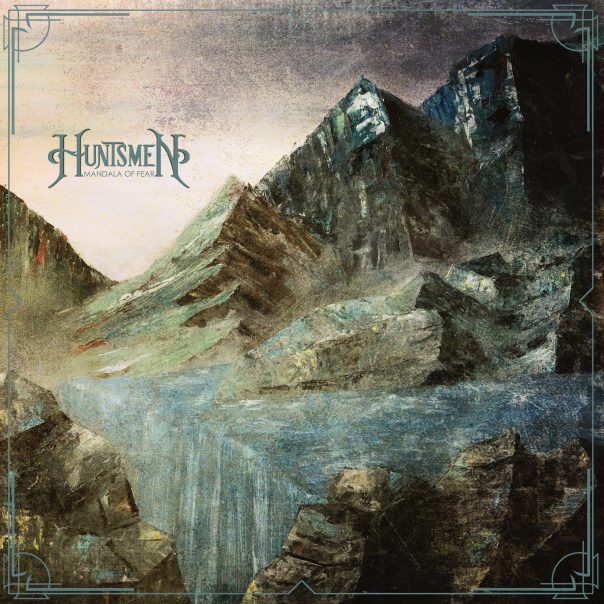ALBUM REVIEW: Huntsmen’s Americana metal turns sci-fi Western on ‘Mandala of Fear’

The term “Americana Metal” might seem outlandish, but Chicago’s Huntsmen find the middle ground between alt-country and stoner rock through the two genres’ common ground in storytelling. On this 85-minute double album, the band pushes itself as musicians and narrators. Driven by a musical conflation of prog, sludge and stoner music of old Mastodon and Elder with the traditions of American songwriting, Huntsmen take cues from “Mad Max,” “Dune” and Ray Bradberry for a truly original concept. Mandala of Fear whisks you away to Huntsmen’s world, one of fleshy riffs, dexterous grooves, diverse singing and sci-fi deserts.
Mandala of Fear
Huntsmen
Prosthetic Records, March 13
Released with a 32-page graphic novel, Mandala of Fear’s concept is incredibly involved.
Lead single “Ride Out” introduces the protagonist, a soldier embarking with her squad with no idea what she will have to endure. The song’s exhilarating vocals, propulsive drumming and ascending electro-acoustic guitar riffs embody an unwavering jump into the unknown.
It’s the perfect contrast to the gritty sludgecore of second single “A Nameless Dread,” which centers on the antagonist, The Colonel—leader of merciless pirates. The song’s use of blast beats and black metal shrieks embody the psychotic worldview of a man bent on ruin and genocide. Yet the music still provides some addictive riffs and tasteful nods to American folk.
Considering how important narrative is to Huntsmen’s art, it’s incredible to hear the band set a scene without words. The massive riffs and bombastic switch-ups of “Atomic Storms” may as well be the deadly weather our hero barely survives. In the same way, the immaculate Steely Dan shuffle beat and galloping bass arpeggios bring the sand-scouring “Pirates of The Waste” to mind, and the psychedelic dronescape of “Hill People Drugs” evokes the recuperating soldier’s post-apocalyptic acid trip.
The brush-on-snare percussion and mournful chord progressions of “Loss” provide a moment of grief for a traumatized, pregnant warrior mourning the loss of a would-be-father. Whether interpreted individually or contextualized within the story, the very sound on Mandala serves a distinct narrative and musical statement.
With so much heady material at play, the classic stoner rock buzz of “Colossus” is a welcome return to form. Like Sleep’s Dopesmoker, the evocative nature of hard-grooving desert rock can’t be ignored. “God Will Stop Trying” emphasizes the voice and guitar chemistry between Kirill Orlov and Chris Kang. They trade verses and reach for the stars in a passionate ode to the weary, forsaken wanderer.
The emotional depth of the album finds a balance with compelling musicality. Kang’s aganized rasps coincide with the soldier finding the discarded corpses of her squad on “Bone Cathedral,” but it’s just as easy to get lost in Ray Knipe’s rhythmic subdivisions or the chilling sludge metal cavalcade at its close.
The two longest tracks, “Awake at Time’s End” and “The Swallow,” showcase Huntsmen at their most breathtaking. The former waves a tale of love, loss and inescapable adversity, which you can hear through a mood swing in the riffs and singing—and that’s not to mention the sweeping instrumental jam that takes up its second half. The latter’s bludgeoning riffs, indulgent soloing and an empowering atmosphere embody the album’s overarching themes of resilience and perseverance.
It’s easy to empathize with the soldier’s plight, which allows cuts like “The Silver Lining” to hit harder. The song’s bulldozing sludge-doom barrage is fueled by a decision to stick it out in the face of adversity. The primitive guitar playing, lyrical guitar soloing and menacing snarls hit with dedication, like on closer “Clearing The Sand.” The cut really does feel like the end of a journey, imparting an aura of triumph as the soldier resolves to leave her hardship behind and focus on giving a better world to her unborn child. Soaring guitar leads spiral around heartfelt vocals and the guitar playing adorns leveling distortion with delicate motifs.
Mandala of Fear is the kind of record to soak in and enjoy on multiple levels. The best part is that every facet of the record remains engaging. Taken as a giant concept, the record is engrossing. Taken individually, each song works wonders. Taken as a milestone in the relationship of Americana and metal, it’s nothing short of masterful.
Follow Max Heilman at Twitter.com/madmaxx1995 and Instagram.com/maxlikessound.
